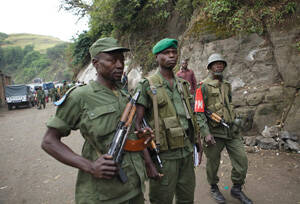Some 1.5 billion people live in countries affected by repeated cycles of political and criminal violence, the World Bank reports in its latest development study. Noting that military and development disciplines too often work on separate paths, World Bank President Robert Zoellick called for bringing security and development together to break the cycles of fragility and violence that trap states in conflict and rob their citizens of economic and human development opportunities.
“While much of the world has made rapid progress in reducing poverty over the past 60 years, areas suffering from political instability and criminal violence are being left far behind and face stagnation, both in terms of economic growth and disappointing human development indicators,” said Justin Lin, the World Bank’s chief economist.
People living in countries currently affected by violence are twice as likely to be undernourished, and 50 percent more likely to be impoverished. Their children are three times as likely to be out of school, researchers report. More than 42 million people are displaced globally as a result of conflict, violence or human rights abuses. “And the effects of violence in one area can spread to neighboring states and to other parts of the world,” said Zoellick, “hurting development prospects of others and impeding economic prospects for entire regions.”
The World Development Report 2011: Conflict, Security and Development found that “no low-income, fragile or conflict-affected country has yet to achieve a single Millennium Development Goal.” Those goals, accepted by Western nations in 2000, aimed to cut in half the worst effects of global poverty in, for example, sanitation, health, hunger and educational attainment by 2015. Fixing the economic, political and security problems that disrupt development and trap fragile states in violence requires strengthening national institutions and improving governance in ways that prioritize citizen security, justice and jobs. It is a process that must be counted out in decades, not years, researchers said.
According to the report, in the 21st century organized violence appears to be spurred by a range of domestic and international stresses, like youth unemployment, income shocks, tensions among ethnic, religious or social groups and drug trafficking networks. Conflict over resources, as in the Democratic Republic of Congo, or violence generated by drug trafficking, as in Mexico and Central America, exemplify the style of violence in the new century. Unemployment was overwhelmingly cited as the most important factor for recruitment into gangs and rebel movements. Risks of violence are greater when high social stresses combine with weak capacity or lack of legitimacy in key national institutions, as indicated by the recent turbulence in the Middle East and North Africa.
Building or restoring capable, legitimate institutions is crucial because they are able to mediate the stresses that otherwise lead to repeated waves of violence and instability. More than 90 percent of civil wars in the 2000s occurred in countries that had already experienced civil war in the previous 30 years. The report suggests short-term measures aimed at successful transitions from violence to rebuild confidence between citizens and the state. These include improving government transparency, special budget allocations for disadvantaged groups, removal of discriminatory laws and credible commitments to realistic timelines for longer-term reform.








